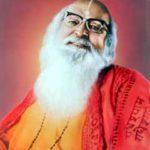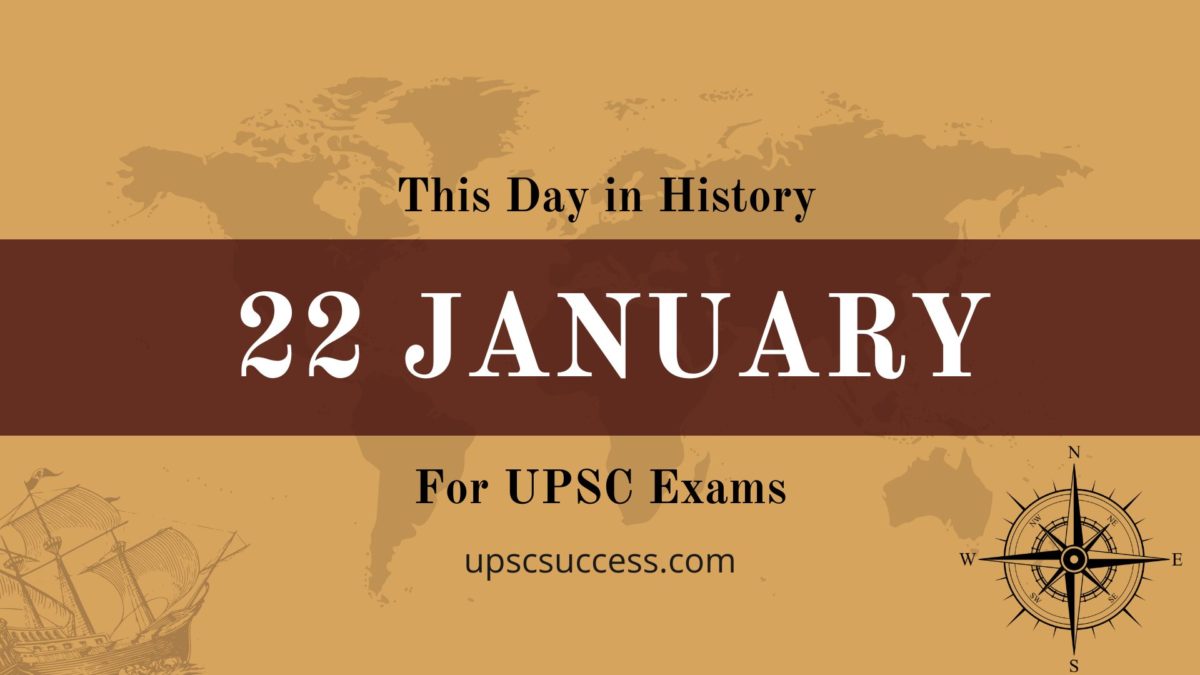Contents
This Day in History on 22 January
The historical events hold a lot of value for aspirants who are sitting for UPSC competitive exams including the IAS Exam.
On this page, we will list all historical events that occurred on 22 January. The students can refer to them while preparing for all competitive exams and banking exams.
Important Days
–
Important Events
1760: In the battle at Wandiwash (India), after their victory against the French, the British virtually had no European opponent left in India.
1901: After the death of Queen Victoria, Edward VII became the King of England.
1924: Ramsey MacDonald became the first Prime Minister of the Labor Party in Britain.
1945: The Indian 7th Division captures Tilin at Burma.
1947: The Constitution Committee approved a resolution on the outline of the Indian Constitution.
1963: ‘National Library for the Blind’ established at Dehradun. The first national institute of its kind.
1965: Plutonium Project (Sanyantra) was inaugurated at Trombay, Mumbai.
1967: Atomic Energy Center was renamed after Homi Jahangir Bhabha as ‘Bhabha Atomic Research Centre’ at Trombay, Mumbai.
1971: Sarvmittra Sikri becomes the 13th Chief Justice of India.
1986: Indira Gandhi Rajbhasha Awards instituted.
1986: Satwant Singh, Balbir Singh and Kehar Singh, all sikhs, were sentenced to death for the assassination of India’s Prime Minister Indira Gandhi.
1990: The International Literacy Campaign was launched in the country by the Prime Minister at a national function held in New Delhi.
1992: Bharat Ratna, India’s highest award, was announced to be given to Netaji Subhash Chandra Bose.
1992: Government raises Suzuki share in Maruti to 50 per cent making it the first public sector company to go private.
1998: Second Lieutenant Punit Datta is posthumously selected for the nation’s highest peace time gallantry award, Ashok Chakra.
2001: A missile carrier ship INS Mumbai launches into the Indian Navy.
2009: The film Slumdog Millionaire had nominated for an Oscar.
2015: “Beti Bachao, Beti Padao” scheme was established by the present Prime Minister Narendra Modi in Panipat, Haryana
2002: Kmart becomes the largest retailer in United States history to file for Chapter 11 bankruptcy protection.
2006: Evo Morales is inaugurated as President of Bolivia, becoming the country’s first indigenous president.
2007: At least 88 people are killed when two car bombs explode in the Bab Al-Sharqi market in central Baghdad, Iraq.
2015: An explosion near a civilian trolley-bus in Donetsk kills at least thirteen people.
Birth/Birth Anniversary

1561: Francis Bacon, an English philosopher, and statesman.
1788: Lord Byron, a British peer, who was a poet and politician.
1877: Tarun Ram Phookun, ”Deshabhakta”, great lawyer, orator, eminent writer and President of the Assam Chhatra Sammelan in 1928, was born in Gauhati, district Kamrup, Assam.
1891: Antonio Gramsci, an Italian Marxist writer, and politician.
1897: Dilipkumar Roy, a Bengali Indian musician, musicologist, novelist, poet and essayist. (d. 1980)
1899: Suryakant Tripathi, known by his nom de plume Nirala, was an Indian poet, novelist, essayist, and story-writer.
1901: Nirmal Kumar Bose, a leading Indian anthropologist.
1903: Shankar Das Banerji, lawyer and politician, was born at Calcutta.
1906: Judge Jayantilal Chhotalal Shah, chief Justice and Supreme Court of India, was born.

1916: Harilal Upadhyay, a Gujarati novelist, Indian author, poet, and astrologist (d. 1994)
1922: Shanta Buddhisagar, famous Marathi writer, was born.
1934: Vijay Anand, an Indian filmmaker, producer, screenwriter, editor, and actor.
1934: Vijay Anand, Indian actor, director, producer, and screenwriter (d. 2004)
1949: Manik Sarkar, an Indian politician who served as the Chief Minister of Tripura.
Death/ Death Anniversary
1666: Shahjahan (Sjihab Al-Din Sultan C Shah D Jahan), the fifth Mughal emperor. The great Mughal emperor, died at the Agra fort as a prisoner, to rest besides Mumtaz in Taj Mahal. Jahanara arranged that Sahjahan be laid.
1683: Shri Samarth Ramdas passed away.
1799: Horace Bénédict de Saussure, a Genevan geologist, meteorologist, physicist, mountaineer and Alpine explorer.
1858: Veer Narayan Singh, freedom fighter, was sentenced to death.
1886: Harikrishna Premi, Hindi writer, passed away.
1901: Queen Victoria, the Queen of the United Kingdom of Great Britain and Ireland. Queen Victoria (1819-1901) passed away at Osborne House, Isle of Wight, South England, after a brief illness. She had been throned for almost 64 years, which is the longest reign in British history. She had given her name to an age “Victorian Britain”.
1957: Paul Walden, a Russian, Latvian and German chemist known for his work in stereochemistry and history of chemistry.
1967: Pandurang Sadashiv Khankhoje, an Indian revolutionary, scholar, agricultural scientist, and historian who was among the founding fathers of the Ghadar Party.
1972: Swami Ramanand Tirtha, an Indian freedom fighter, educator, and social activist.
1973: Lyndon B. Johnson, an American politician who served as the 36th President of the United States.
1999: Graham Staines, Australian-Indian missionary and translator (b. 1941)

